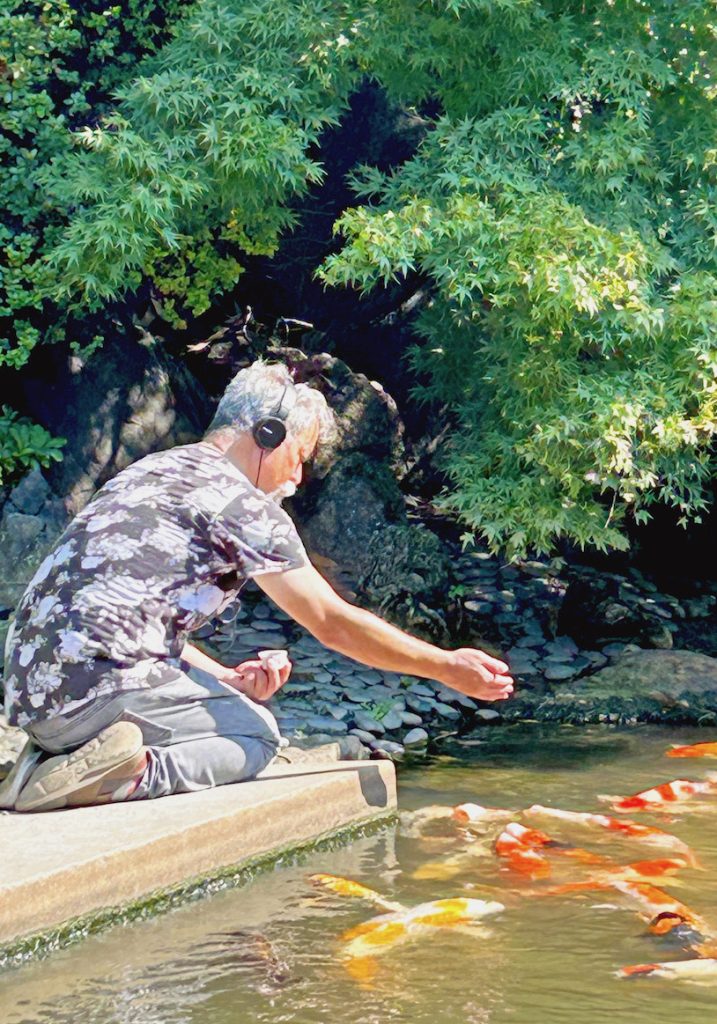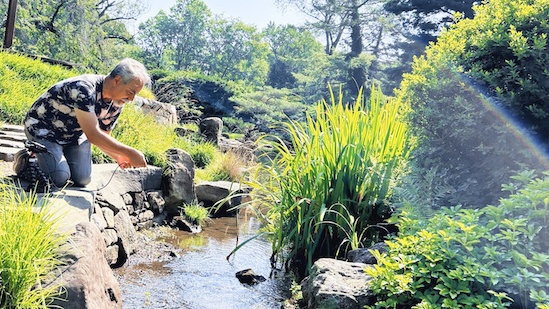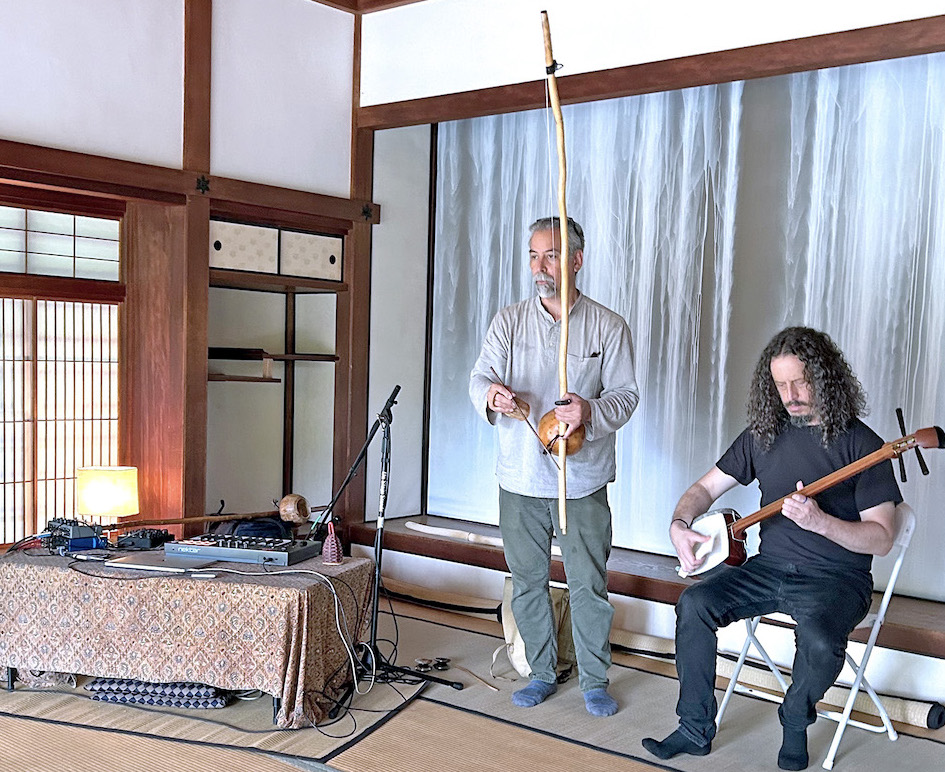Sound artist Jason Finkelman performs in
miniresidency at Shofuso in Philadelphia.
By Rob Buscher, P.C. Contributor
During the first week of August, Japanese American sound artist Jason Finkelman returned to his native city of Philadelphia for a miniresidency at Shofuso Japanese House and Garden.
The artistic residency at Shofuso provided Finkelman time to further explore his distinct ambient, avant-garde world sound by recording natural and ambient sounds of the property to utilize in his laptop electronics performance setup. Combining underwater reverberations of koi fish using a hydrophone (underwater microphone) with daily sounds of Shofuso garden maintenance, Finkelman then performed alongside the recorded audio using live percussion instrumentation for members of the Japan America Society.
Raised in a Jewish household in the Wynnefield Heights neighborhood of West Philadelphia, Finkelman explored the adjacent West Fairmount Park areas extensively throughout his youth. Learning about the 1876 Centennial International Exhibition from his father — an architect who is also an amateur historian of the Centennial Expo — this led Finkelman to regularly visit areas that housed the world’s fair.
At the site of the Centennial Exposition’s Horticultural Hall, Finkelman would also take inspiration from the nearby Japanese House and Garden, brought to this location in 1958 after earlier showing at New York’s Museum of Modern Art from 1954-55.

Jason Finkelman captured underwater reverberations of koi fish using a hydrophone (underwater microphone). (Photo: Rob Buscher)
As a biracial fourth-generation Japanese American whose family suffered forced removal from California and mass incarceration during World War II, Shofuso became a place of reflection for Finkelman’s emerging identity as an artist.
On his mother’s side, Jason’s Miyahara family was incarcerated at Rohwer relocation center before resettling in Bridgeton, N.J., where they worked for Seabrook Farms.
“During my formative years as a creative musician in Philadelphia, I began investigating my Japanese American heritage,” Finkelman recalled. “I started to understand the circumstances that led my family to the Philadelphia area after the war with grandparents who joined 2,500 other Japanese Americans in 1946 for employment at Seabrook Farms in South Jersey. Inside and outside the grounds of Shofuso, I could imagine alternative realities, play instruments handcrafted by Adimu Kuumba and contemplate the horrors of the atomic bombings of Hiroshima and Nagasaki.”
Leaving Philadelphia in 1992 to earn a jazz studies degree at SUNY New Paltz, Finkelman would perform with noted figures in improvisation and global music, including Pauline Oliveros and Steve Gorn.
His career as a composer for dance centers around collaborative work with award-winning choreographer Cynthia Oliver, whom he met at another important Philadelphia institution, the Painted Bride Art Center, where Finkelman was employed before leaving his hometown.
After establishing the Straylight Dialogues series at New York City’s famed Knitting Factory in the late 1990s, Finkelman and Oliver relocated to Illinois, where they were both employed by the University of Illinois at Urbana-Champaign in 2000.
At UIUC, Finkelman is director of Global Arts Performance Initiatives at Krannert Center for the Performing Arts and leads Improvisers Exchange, a multifaceted programming line presenting concerts, workshops and residencies with improvising artists that includes a student performance ensemble in the School of Music.

Finkelman also recorded sound from a stream while at Shofuso.(Photo: Rob Buscher)
One highlight of Finkelman’s residency was the special performance he gave during the Japan America Society of Greater Philadelphia’s Members Night, which was hosted at Shofuso on the evening of Aug. 8.
Accompanied by New York City-based guitarist and shamisen player Geoff Gersh, Finkelman performed a stirring assortment of original composition and improvisation after opening with an acoustic duet featuring Finkelman on berimbau, a musical bow originating in West Africa commonly used in Brazilian Capoeira, and Gersh on shamisen.
Finkelman then shared clean audio samples of the ambient sounds recorded at Shofuso and demonstrated how he could integrate them into a performance setting with his laptop electronics. The two musicians then proceeded to perform several improvised pieces using the samples as a starting point for each musical meditation.
The following evening, the residency ended with a culminating performance at the closing reception of the special exhibition “Community of Images: Japanese Moving Image Artists in the U.S., 1960s-1970s,” which was curated by digital film archive Collaborative Cataloguing Japan and co-presented by Japan America Society.

Jason Finkelman, playing a berimbau, performs an acoustic duet with shamisen player Geoff Gersh at Shofuso. (Photo: Rob Buscher)
In this setting, Finkelman presented an eclectic trio of improvising musicians including Gersh from the previous night’s performance and featuring theremin player and keyboardist Joy Yang of Urbana.
“The opportunity to perform with Joy Yang, an original member of my current ensemble Kuroshio, and longtime collaborator Geoff Gersh bridges musical universes of over two decades. I was very excited to blend the artistry of Straylight and Kuroshio together for this occasion,” said Finkelman.
The trio performed a 75-minute set of improvised music, split into approximately six distinct pieces. Many made use of the audio samples that Finkelman recorded earlier in the week during his residency at Shofuso.
The group also performed one prewritten piece titled “Bereavement,” previously performed by Finkelman and Yang as part of their Kuroshio Quartet. The piece paid tribute to victims and survivors of the atomic bomb and was performed on Aug. 9, the 79th anniversary of the Nagasaki bombing.
It was a fitting end to the “Community of Images” exhibition, which featured artists and movements that have inspired some of Finkelman’s creative work. In turn, the trio’s performance conveyed their own feelings of inspiration to the Philadelphia audience as Finkelman ended the set with a protest chant from one of the video art pieces featured in the exhibit that was produced during the Vietnam War era. “What do we want? Peace! When do we want it? Now!”
To learn more about Jason Finkelman and his music, visit https://jasonfinkelman.bandcamp.com/album/kuroshio.



